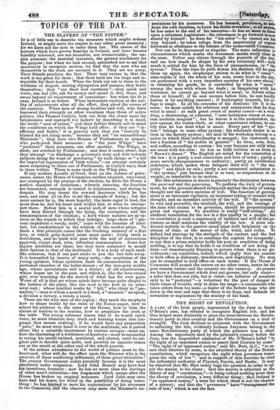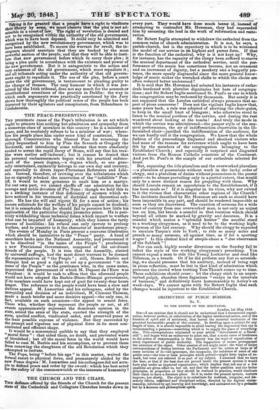THE RIGHT OF REVOLUTION.
A PART of the Irish people, represented by the Jury in Smith O'Brien's case, has refused to recognize English law, and has thus helped more distinctly to place the issue between the Revolu- tionary party in that country and the Government on a trial of strength. The Jury declines to cooperate with the Government in enforcing the law, evidently because Jurymen belong to the same Revolutionary party of which the prisoner was a chief. Among the arguments used by the prisoner's counsel before the Jury, was the unqualified admission of Mr. O'Brien's belief "in the right of an oppressed nation to assert their liberties by arms." "The right of an oppressed nation," said Mr. Butt, Q.C., "to as- sert their liberties by arms, is the admitted theory of the British constitution, which recognizes the right when governors trans- gress the rule of law": and in support of this doctrine he cited the influential authority of Plunket, Saurin, and Bushe. It may be observed that Mr. Butt trebly begs the question in order to ap- ply the maxim to his client : that the maxim is admitted as the theory of any " constitution,"—it being indeed nothing more thrdi the theory of revolution, a very different thing ; that Ireland is "an oppressed nation," a term for which there is not the shadow of a pretext ; and that the " governors " have " transgressed the rule of law," which is not the fact. 'rating it for granted that a people hose a right to vindicate their liberty by arms, We must observe that the plea is not ad- missible in a court of law. The right of revolution is denied and not to be recognized within the authority of the old government, which was to have been deposed. It could only be admitted and recognized by the new revolutionary government, which was to have been established. To secure the warrant for revolt, the in- surgents should ascertain that they are backed by the most powerful section of the people, and that they will be able to insti- tute that new government before which to carry their plea ; it being a plea quite in accordance with the existence and power of the new government. But it is antagonistic to the action and very existence of the old government, which must repudiate it ; and all tribunals acting under the authority of that old govern- ment ought to repudiate it. The use of the plea, before a court under the old government, is tantamount to pleading guilty to the charge of treason. The easy humour in which it was per- mitted by the Irish tribunal, does not say much for the acumen or constitutional soundness of the practice in Dublin: the way in which such arguments were practically sanctioned by the Jury shows how thoroughly the political sense of the people has been depraved by their agitators and conspirators, from Ribandmen to Confederates.























 Previous page
Previous page